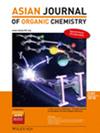新型苯并吡唑类幽门螺杆菌IMPDH选择性抑制剂的设计与开发
IF 2.7
4区 化学
Q1 CHEMISTRY, ORGANIC
引用次数: 0
摘要
幽门螺杆菌(h.p ylori)是一种革兰氏阴性细菌病原体,可导致胃炎、消化性溃疡和胃癌。目前的治疗方案包括三联或四联抗生素治疗;然而,抗生素耐药性的上升需要开发替代治疗策略。这项研究探索了靶向幽门螺杆菌肌苷-5-单磷酸脱氢酶(HpIMPDH)的潜力,该酶是细菌增殖所必需的嘌呤核苷酸生物合成的关键酶。设计并合成了一系列新的苯并吡唑衍生物作为潜在的HpIMPDH抑制剂。生化实验表明,合成的化合物具有较强的抑制活性,SN-8.1和SN-8.2的IC50值分别为0.122和0.187µM。这些化合物对人类IMPDH2的抑制作用最小,表明对细菌酶有选择性。分子对接研究进一步证实了在HpIMPDH活性位点的强结合亲和力。细胞毒性试验表明,化合物在测试浓度下无毒。这些发现表明,基于苯并吡唑的HpIMPDH抑制剂为开发新的抗h提供了一个有希望的策略。螺杆菌代理。本文章由计算机程序翻译,如有差异,请以英文原文为准。

Design and Development of New Benzopyrazole Derivatives as Selective Inhibitors of Helicobacter pylori IMPDH
Helicobacter pylori (H. pylori) is a Gram‐negative bacterial pathogen responsible for gastritis, peptic ulcers, and gastric cancer. Current treatment regimens involve triple or quadruple antibiotic therapies; however, the rise in antibiotic resistance necessitates the development of alternative therapeutic strategies. This study explores the potential of targeting H. pylori inosine‐5‐monophosphate dehydrogenase (HpIMPDH), a crucial enzyme in purine nucleotide biosynthesis essential for bacterial proliferation. A novel series of benzopyrazole derivatives was designed and synthesized as potential HpIMPDH inhibitors. Biochemical assays revealed that the synthesized compounds exhibited potent inhibitory activity, with SN‐8.1 and SN‐8.2 displaying IC50 values of 0.122 and 0.187 µM, respectively. These compounds showed minimal inhibition of human IMPDH2, suggesting selectivity toward the bacterial enzyme. Molecular docking studies further confirmed strong binding affinities at the HpIMPDH active site. Cytotoxicity assays indicated that the compounds were nontoxic at the tested concentrations. These findings demonstrate that benzopyrazole‐based HpIMPDH inhibitors offer a promising strategy for the development of new anti‐H. pylori agents.
求助全文
通过发布文献求助,成功后即可免费获取论文全文。
去求助
来源期刊

Asian Journal of Organic Chemistry
CHEMISTRY, ORGANIC-
CiteScore
4.70
自引率
3.70%
发文量
372
期刊介绍:
Organic chemistry is the fundamental science that stands at the heart of chemistry, biology, and materials science. Research in these areas is vigorous and truly international, with three major regions making almost equal contributions: America, Europe and Asia. Asia now has its own top international organic chemistry journal—the Asian Journal of Organic Chemistry (AsianJOC)
The AsianJOC is designed to be a top-ranked international research journal and publishes primary research as well as critical secondary information from authors across the world. The journal covers organic chemistry in its entirety. Authors and readers come from academia, the chemical industry, and government laboratories.
 求助内容:
求助内容: 应助结果提醒方式:
应助结果提醒方式:


